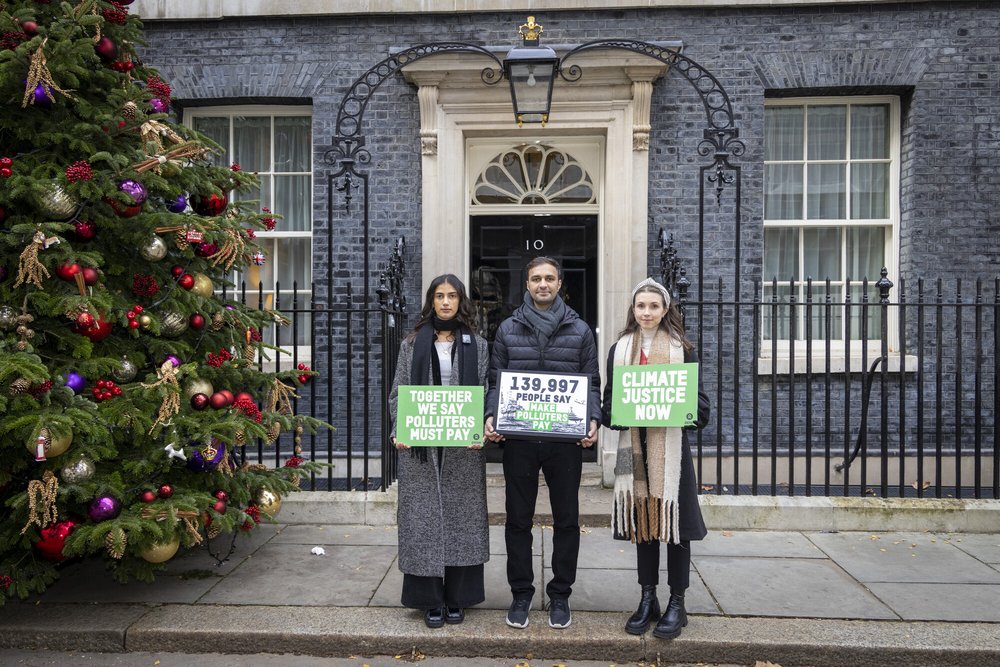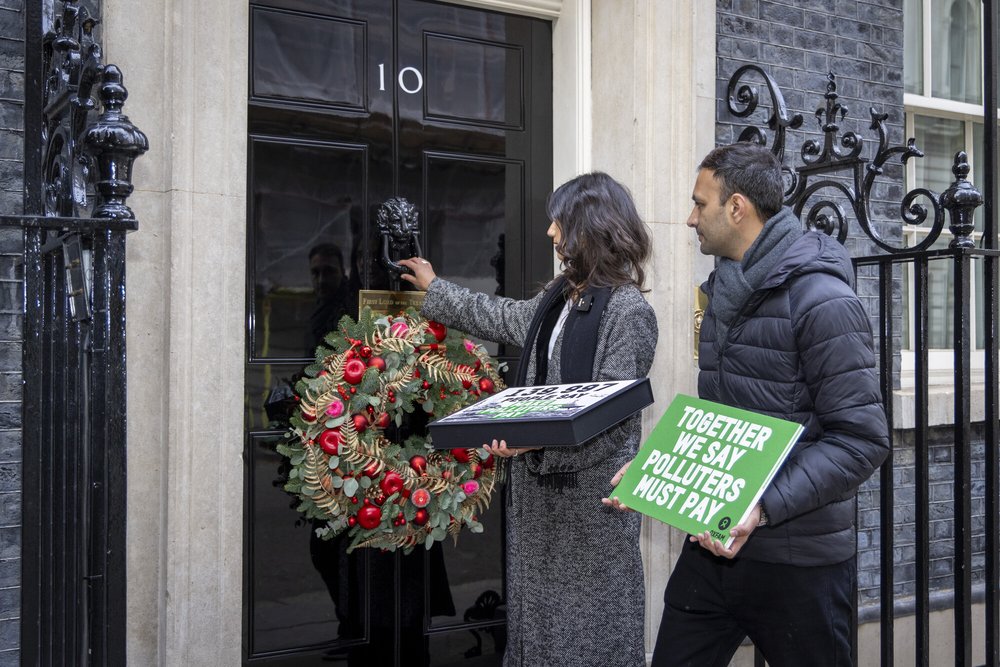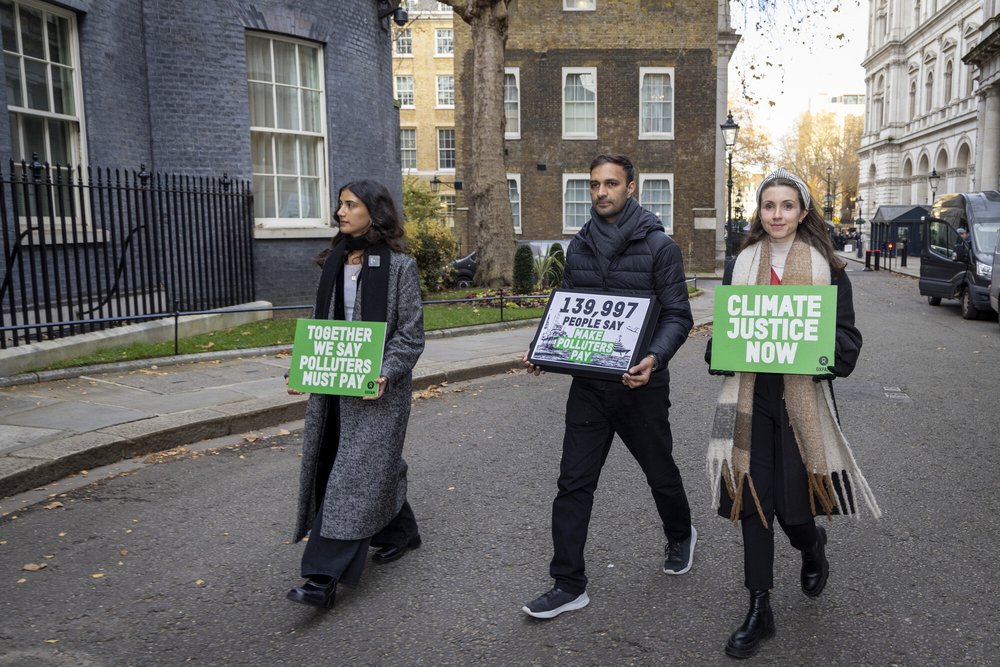Over 139,000 people call on the Prime Minister to make polluters pay
- Oxfam delivered a petition signed by almost 140,000 of you to the Prime Minister.
- It asks him to make sure those who pollute the most, pay the most to address climate change.
- There is still time to sign the petition before it is handed again to world leaders at COP28. Add your name now!
Ellie Gomez-Price (Campaigns Officer, Oxfam), Muhammad Qasim (Constituency campaigner) and Natalie Shortall, (UK Government Relations Advisor - Climate Justice, Oxfam) hand in petition at 10 Downing Street, London. Image: Andy Aitchison / Oxfam

What will make the global climate summit a success?
As world leaders convene at the global climate summit, COP28, its success will be measured by how fast and how fairly governments take action to tackle the climate emergency. Critical to this question of fairness will be who pays for this action. This week, Oxfam delivered a petition to the Prime Minister – signed by almost 140,000 of you – asking him to make sure that those who pollute the most, pay the most to address climate change.
Leslie Searles/Oxfam
They appropriated resources, they built empires, it was gold, it was silver, it was rubber, now it is oil and gas.””
Climate activist Pavel Martiarena in Peru.
The climate crisis doesn’t have to cost us all the earth
COP28 is taking place in Dubai against a backdrop of another year of extreme heat, drought, flooding and other climate impacts that effect people living in poverty the most, as well as projections that set us on a course for up to 2.9C of warming – that's if current policies in place are followed through. Yet, earlier this autumn, we saw the government retreating on a string of climate commitments designed to help the UK reach net zero by 2050, warning that to do otherwise would impose “unacceptable costs” on British families. But that’s a false trade off.
Ambitious action to prevent the worst of climate breakdown does not have to be at the expense of ordinary people, not if the biggest and richest polluters carry a fairer share of the cost.”
Natalie Shortall, UK Government Relations team, Oxfam GB
Every increment of warming will translate into more devastating climate impacts, so tackling the climate crisis now will mean that less costs are incurred in the long run. But, ambitious action to prevent the worst of climate breakdown does not have to be at the expense of ordinary people, not if the biggest and richest polluters carry a fairer share of the cost.
The thousands of people who have signed this petition have called on the Prime Minister to make that happen – by fairly taxing the extremely wealthy, whose emissions are orders of magnitude greater than the average, and the most polluting sectors, such as the fossil fuel industry. Currently, wealth is taxed at a much lower proportionate rate than work, which has led to runaway inequality, and fossil fuel producers are being handed billions in public money to support the continued production of climate-wrecking fuels.
For instance, due to a loophole in the windfall tax on oil and gas companies, it is estimated that they will receive £11.9 billion in tax relief between 2022 and 2028. That’s more than the entire budget that the UK has committed to support lower-income countries to address climate change over a six-year period. Meanwhile, a recent Oxfam report found that the emissions of the richest 1% in 2019 were enough to cause 1.3 million excess deaths due to heat. It’s no wonder the movement demanding fairer ways to tackle the climate crisis is growing.
Ellie Gomez-Price (Campaigns Officer, Oxfam) and Muhammad Qasim (Constituency campaigner) hand in petition at 10 Downing Street, London. Image: Andy Aitchison / Oxfam

The climate justice movement is growing
Nineteen celebrities and influential figures, including Annie Lennox and Bill Nighy, are also among those calling on the Prime Minister to make the biggest and richest polluters pay. The collective of actors, musicians, artists and designers penned an open letter, highlighting the injustice that those least responsible for the climate emergency are suffering its worst impacts.
COP28 is making some strides to address this, with the ‘Loss and Damage’ fund now established, and countries pledging money into it. This fund will support low-income countries to recover when a climate impact hits, but current pledges into it are small, and in the case of the UK's commitment, the finance will be repurposed from other critical development budgets – effectively robbing Peter to pay Paul.
Ellie Gomez-Price (Campaigns Officer, Oxfam), Muhammad Qasim (Constituency campaigner) and Natalie Shortall, (UK Government Relations Advisor - Climate Justice, Oxfam) hand in petition at 10 Downing Street, London. Image: Andy Aitchison / Oxfam

There’s no shortage of money – but the political courage is lacking
From supporting countries such as those across East Africa, which are losing livestock, livelihoods and lives due to a drought and hunger crisis made 100 times more likely be climate change, to helping households in the UK to make their homes more energy efficient and bring down energy bills – it’s a simple truth that fairly tackling the climate crisis demands more money. But there is no shortage of it – recent research found that a range of measures targeted at the biggest and richest polluters in the UK could have raised an additional £23 billion for the Treasury last year alone. What is needed now is the political courage to bring excessive wealth and profit into public hands, properly invest in a just transition, and support communities most exposed to climate breakdown.
It’s only fair that those with the broadest shoulders carry the heaviest burden. When those with the broadest shoulders also have the largest footprints, the case couldn’t be clearer.
More posts like this
